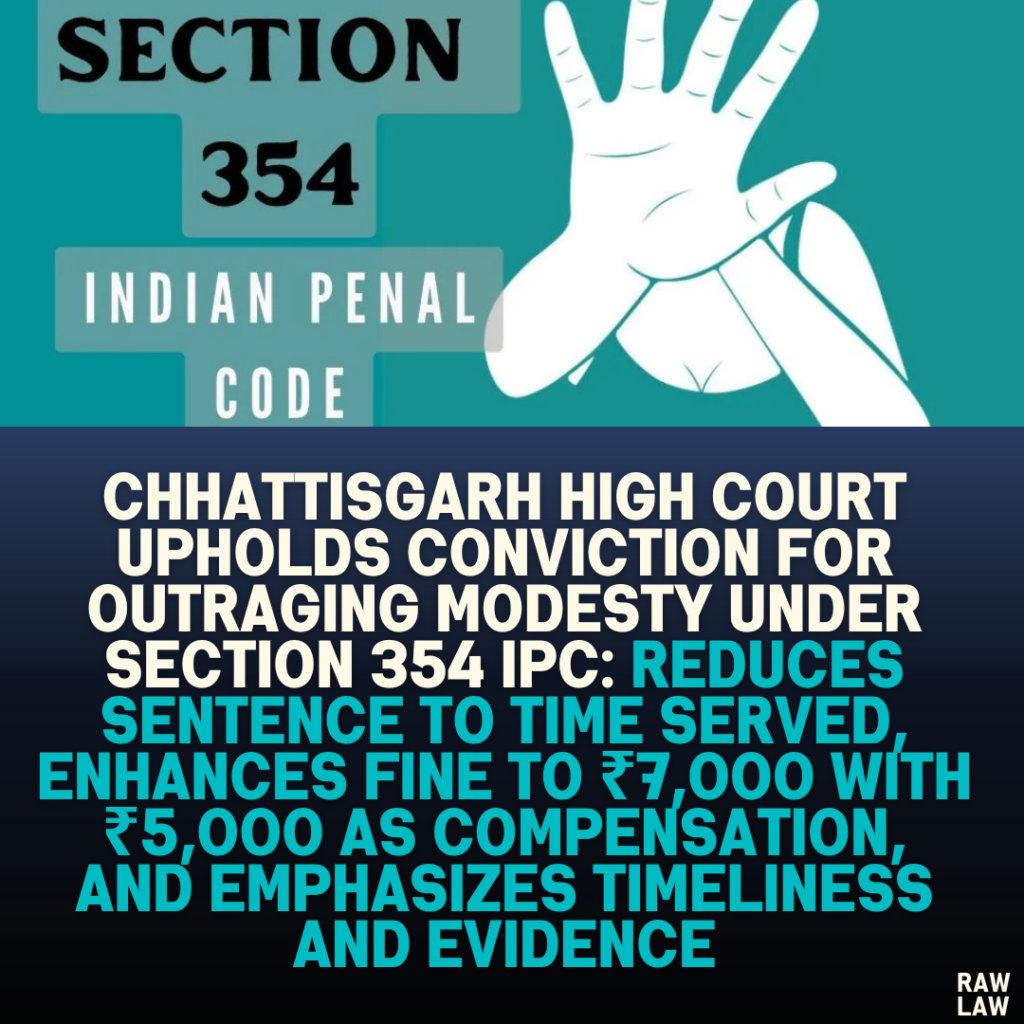Court’s Decision
The Chhattisgarh High Court upheld the applicant’s conviction under Section 354 of the Indian Penal Code (IPC), which pertains to the use of criminal force or assault with the intent to outrage a woman’s modesty. However, the court modified the sentence, reducing it to the period already undergone by the applicant (17 days). Additionally, the court increased the fine from ₹500 to ₹7,000, directing that ₹5,000 from the fine amount be paid to the victim as compensation. If the fine is not paid within two months, the applicant will serve an additional three months of rigorous imprisonment.
Facts
- Incident Description: The incident occurred in 2008 when the victim was returning from her cornfield after cutting grass. The applicant allegedly approached her, made inappropriate remarks, and grabbed her hand. When the victim resisted and raised an alarm, the applicant fled the scene.
- Witnesses: The victim’s mother-in-law witnessed the applicant fleeing the scene after hearing the victim’s cries. Later, the victim narrated the incident to her husband upon his return home.
- Delay in Reporting: Initially, the victim and her family attempted to resolve the matter through a village Panchayat. However, when the Panchayat failed to resolve the issue, the victim filed an FIR ten days after the incident.
- Prosecution Case: The trial court convicted the applicant based on the testimony of the victim and corroborative evidence provided by her mother-in-law and husband.
Issues
- Was the delay in filing the FIR justifiable?
- Did the prosecution sufficiently prove the charge under Section 354 IPC?
- Was it appropriate to modify the sentence considering the applicant’s age and the time elapsed?
Petitioner’s Arguments
The applicant’s counsel argued:
- Delay in FIR: The ten-day delay in lodging the FIR raised doubts about the prosecution’s case.
- Reliability of Evidence: The witnesses were interested parties, and their testimony contained contradictions and omissions.
- Reduction of Sentence: The applicant was 35 years old at the time of the incident and is now over 51 years old. Considering the time elapsed since the incident and the fact that the applicant had already served 17 days in jail, a reduction in sentence was sought.
Respondent’s Arguments
The State contended:
- Justification for Delay: The delay in filing the FIR was explained by the victim’s attempt to resolve the matter through the Panchayat and her hesitation to approach the police immediately due to societal pressures.
- Sufficiency of Evidence: The victim’s testimony was corroborated by witnesses and documentary evidence, establishing the guilt of the applicant beyond a reasonable doubt.
- Sentence Justification: Given the gravity of the offense, the sentence imposed by the trial court and upheld by the appellate court was appropriate and did not warrant interference.
Analysis of the Law
- Section 354 IPC (Pre-2013 Amendment): At the time of the incident in 2008, Section 354 IPC prescribed imprisonment of up to two years, a fine, or both for using criminal force or assault to outrage a woman’s modesty.
- Section 354 IPC (Post-2013 Amendment): The Criminal Law (Amendment) Act, 2013, introduced a minimum punishment of one year and a maximum of five years. However, the court clarified that this amendment was not applicable retrospectively.
- Proportionality in Sentencing: The court considered the long delay since the incident, the applicant’s age, and his prior incarceration in reducing the sentence.
Precedent Analysis
The court relied on George Pon Paul v. Kanagalet & Others (2009), where the Supreme Court reduced the sentence to the period already undergone, given the fine had been paid to the victim, and a significant amount of time had passed since the incident. Applying this precedent, the court concluded that sending the applicant back to jail would serve no useful purpose.
Court’s Reasoning
- Delay in FIR: The court accepted the victim’s explanation that the delay was caused by attempts to resolve the matter through the Panchayat and societal pressures. The court noted that delays in reporting such offenses are not uncommon, particularly in rural areas where women may face stigma.
- Credibility of Evidence: The court found the victim’s testimony consistent and corroborated by her mother-in-law and husband, dismissing the petitioner’s claims of contradictions.
- Sentence Modification: The court considered the applicant’s age, the time elapsed since the incident (16 years), and the fact that he had already served 17 days in jail. These factors justified reducing the sentence while enhancing the fine to ensure justice for the victim.
Conclusion
The court upheld the applicant’s conviction under Section 354 IPC. However, it reduced the sentence to the period already undergone and enhanced the fine from ₹500 to ₹7,000. The court directed ₹5,000 from the fine to be paid as compensation to the victim. If the fine is not deposited within two months, the applicant will serve an additional three months of rigorous imprisonment.
Implications
This judgment underscores:
- The importance of timely but reasonable evaluation of delays in filing FIRs, particularly in offenses against women.
- The role of corroborated evidence in securing convictions for crimes against women.
- The application of proportionality in sentencing, balancing the interests of justice with the circumstances of the accused.
